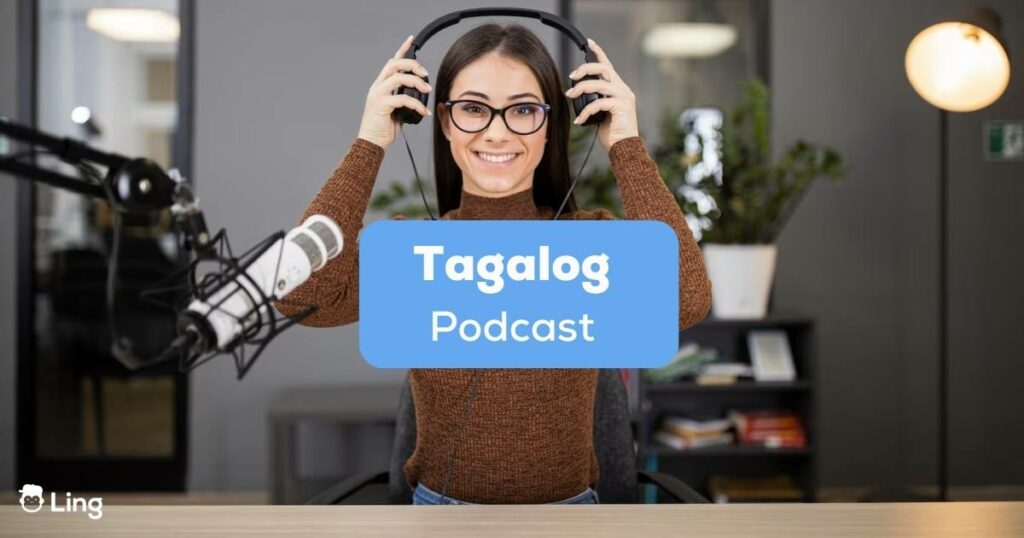Learning a new language can be quite a task. It’s a mix of excitement, curiosity, and a bit of apprehension.
But what if I told you there’s a way to make it fun and more natural?
Well, here’s the deal: Listening to a Tagalog podcast!
It’s a superb approach for those keen on mastering the national language of the Philippines: Tagalog.
So, why a podcast? Well, it’s as engaging as it is educational.
It’s like hitting two birds with one stone: you’re not just passing the time but also learning the Tagalog language naturally, one phrase at a time.
Intrigued? Let’s unpack this further.
The Role Of Podcasts In Language Learning
Learning the Filipino language is not just about words or grammar. It’s about the journey.
A Tagalog podcast can make this journey easier and a lot more fun.
Let’s see how.
The Importance Of Immersion In Language Learning
Ever wondered why we speak our first language so effortlessly?
It’s because we were immersed in it. We constantly hear and use it in various contexts.
That’s the power of language immersion!
It helps you learn a language as it is, with all its idiosyncrasies and nuances.
So instead of just memorizing “Kumusta ka?” or “How are you?” in Tagalog, you’ll understand when and how to use it.
That’s learning with context!
How Podcasts Provide An Immersive Experience
“But wait,” you might ask, “how can I immerse myself without living in the Philippines?”
That’s where podcasts come in handy!
The best Filipino podcasts bring the language to you!
Let’s say you listen to a comedy podcast like “Ang Walang Kwentang Podcast” (“The Nonsense Podcast”).
Here, you’ll hear real people having real conversations about everything from Filipino pop culture to mental health to life lessons and comedy.
It’s like being part of an engaging chat, all while picking up the language naturally.
That, my friends, is a perfect mix of learning and entertainment!

The 9 Benefits Of Listening To A Tagalog Podcast
So, how could Filipino podcasts boost your language skills?
Here, we’ve got nine neat benefits lined up just for you!
Let’s get started.
1. Enhances Listening Comprehension
Let’s dive into the first reason.
Podcasts are audio-based, right?
So, naturally, they’re great for listening practice and comprehension.
But why is this crucial?
The Importance Of Listening Skills In Language Learning
Think of the last time you conversed in your native language.
You had to understand what was said, right?
That’s listening comprehension, and it’s critical for any language.
Why?
Because good listening skills mean better communication.
You’re more likely to respond correctly if you understand what’s being said!
How Podcasts Improve Listening Skills
Here’s where podcasts can help.
Listening to them means hearing Tagalog in various contexts.
You’ll hear different accents, speech rates, and expressions.
All of this sharpens your listening skills. You’ll start understanding Tagalog naturally, not just textbook sentences.
2. Offers Exposure To Natural Language And Colloquialisms
Next up is another perk of Tagalog podcasts. They expose you to natural language and colloquialisms.
But what does this mean exactly?
Understanding The Informal Aspects Of Language
Have you ever heard a phrase not in your textbook but often used by natives?
That’s what colloquialisms are.
They’re an informal part of the language.
They add flavor and realism to your conversations.
And they make you sound more like a native.
How Podcasts Provide Exposure To Everyday Language Use
Podcasts are a goldmine of these colloquial expressions.
They’re not scripted or formal.
They’re conversational and natural.
So, you’ll pick up phrases like “Ano ba yan?” (What is that?) in different contexts.
That’s real language learning right there!

3. Improves Vocabulary And Phraseology
Podcasts can help build your Tagalog vocabulary and understanding of phrases.
But why does this matter?
The Role Of Vocabulary In Language Proficiency
What’s the use of grammar rules without words to apply them to? Limited, right?
That’s why vocabulary is vital!
It’s the building block of language proficiency.
With a rich vocabulary, you can express your thoughts clearly.
How Podcasts Expand Learners’ Vocabulary
This is where Tagalog podcasts shine!
They present words and phrases in context.
Think of it as a language treasure hunt.
You might hear “Saan ka pupunta?” meaning “Where are you going?” over casual chatter.
Gradually, these phrases become part of your vocabulary.
4. Gives Cultural Insights
Podcasts provide cultural insights. But how does Filipino culture connect to language learning?
The Importance Of Cultural Context In Language Learning
Ever used a phrase that doesn’t translate well?
That’s because language and culture are intertwined.
To truly grasp a language, you need to understand its cultural context.
This makes your communication authentic and respectful.
Do you get the importance?
How Podcasts In Tagalog Provide Cultural Context
This is yet another advantage of a Tagalog podcast.
They offer a glimpse into Filipino life.
Topics can range from Filipino mass readings to Philippine history.
This helps you understand the culture behind the language.
It’s like cultural immersion without stepping on Filipino soil!
5. Builds Confidence In Language Use
Moving on, let’s talk about confidence. Surprisingly, podcasts can boost that too. How so?
Confidence And Language Proficiency
Confidence and language proficiency go hand in hand.
You speak better when you’re confident, don’t you?
This applies to any language.
When you’re confident, you’re not afraid to make mistakes.
And it’s through mistakes that we learn.
How Tagalog Podcasts Foster Confidence
Tagalog podcasts create a safe learning space.
You can listen, repeat, and even make mistakes without fear of judgment.
It’s like practicing with a friend who doesn’t judge.
Over time, your speaking skills improve. You gain confidence.
This, in turn, fuels your language-learning journey.

6. Provides Learning Flexibility
Filipino podcasts offer a learning style that can suit you. But why is this important?
The Convenience Of Podcasts In Language Learning
Let’s be honest. We all lead busy lives, right?
Fitting language learning into your schedule can be a challenge.
That’s where podcasts come in handy.
They’re there whenever you’re ready to learn.
Whether you’re commuting, cooking, or jogging, you can listen and learn.
How Podcasts Cater To Various Learning Styles And Paces
A Filipino podcast also caters to various learning styles and paces.
You can replay episodes if you didn’t catch something.
Or pause and look up a word.
It’s tailored to your pace, not the other way around.
This personalization makes learning more effective and less stressful.
7. Improves Pronunciation And Accent
Here’s a reality check: Pronunciation and accent matter, and they matter a lot.
The Importance Of Correct Pronunciation
Pronunciation is a vital component in language learning.
Think about it: mispronouncing a Tagalog word like “baka” (which could either mean cow or maybe) can lead to quite a mix-up!
It’s pivotal to ensure your messages aren’t lost in translation due to incorrect pronunciation.
How Podcasts Help With Pronunciation
Tagalog podcasts typically feature native Filipino speakers.
This means you’re getting the real deal: natural speech speed, proper pronunciation, and correct intonation.
Mimicking the podcast hosts’ pronunciations is similar to a language drill, improving your Tagalog pronunciation with each episode.
8. Offers Exposure To Different Accents
And now, onto accents. Did you know Tagalog has different accents?
Understanding Regional Differences In Tagalog
Tagalog language, though unified as the national language, showcases regional accents.
For instance, the Tagalog spoken in Batangas has a distinct accent compared to the one spoken in Manila.
It’s these subtle variations that make the language so fascinating!
How Tagalog Podcasts Expose Learners To Various Accents
And guess what? You can experience these accents through Tagalog podcasts.
With speakers from different regions of the Philippines, you’re exposed to various accents.
Imagine picking up the vibrant Batangas accent or the soft-spoken Bicolano accent, all from your podcast episodes!
With such diversity, Tagalog podcasts are like your personal accent coach, helping you learn Filipino and its regional accents.

9. Enhances Understanding Of Grammar In Context
Now, let’s tackle grammar: the backbone of any language. Yes, including Tagalog.
The Role Of Grammar In Language Learning
Grammar in language learning is vital.
It’s like the rules of the road guiding your language journey.
Correct grammar usage helps you communicate your thoughts more clearly and effectively in Tagalog.
Remember, it’s not just about words but how you arrange them in a sentence.
How Tagalog Podcasts Demonstrate Grammar Usage
Tagalog podcasts can be your grammar guide, showcasing how words and phrases are used in context.
Listening to podcast episodes gives you practical examples of grammatical structures in use, going beyond the textbook rules.
For instance, hearing the phrase “Mahal kita” (I love you) in a podcast is much more enlightening than just memorizing it.
You get to understand the nuance, the emotion, and the context, which are all essential in understanding Tagalog grammar in use.
Tagalog Podcast-Related Vocabulary
As we talk about Tagalog and podcasts, it’s a good idea to familiarize ourselves with some related vocabulary.
Understanding these words can enrich your podcast listening experience and boost your Tagalog language skills.
These words will undoubtedly serve as valuable additions to your expanding Tagalog vocabulary.
Keep listening and keep learning from the best podcasts in the Philippines!
Learn The Tagalog Language With Ling!
With all the benefits we’ve discussed, why wouldn’t you want to start tuning into a Tagalog podcast?
It’s like having your own personal language tutor right in your ear.
It’s a fun way to break up the monotony of traditional language learning.
But wait! There’s more!
Ever thought of having an interactive language-learning app that makes mastering Tagalog even more fun and engaging?
That’s where the Ling app steps in!
Providing access to over 60 different languages, the Ling app is not just another language-learning tool.
It blends traditional language learning techniques with the latest technology, making learning easy, fun, and effective.
Go and give your language learning a boost by downloading the app from Google Play and App Store now!
Welcome to the Ling community, where language learning meets fun!





























































